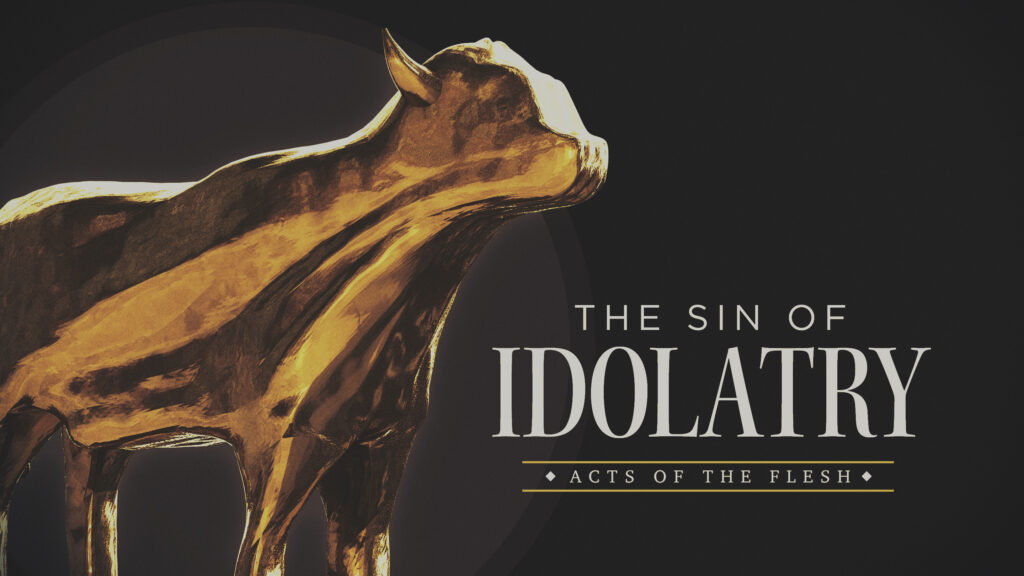
Idolatry | A Bible Class on the Works of the Flesh and the Fruit of the Spirit
Two of the obvious acts of the flesh refer to religious error. Idolatry and witchcraft. Both these sins seek to remove God from his throne and place something else there. Idolatry puts a lifeless object in God’s place as the rightful lord. Witchcraft removes trust in God and seeks to control (or at least to know) the future.
Religious sin has been around since the Creation. Man’s first recorded sin outside the Garden was improper worship (Gen 4:2-5). It appears that God’s displeasure in Cain’s sacrifice was that it was not from the best of his crops. Verse 4 emphasizes that Abel’s sacrifice was the best–“fat portions from some of the firstborn of his flock.”
From that time on, worship has often been an object of sin. The history of Israel proves this. The Colossians were warned about “the worship of angels” (Col 2:18).
Why do sins concerning worship seem to be so prevalent?
The patriarchs were idolators. “Long ago your ancestors, including Terah the father of Abraham and Nahor, lived beyond the Euphrates River and worshiped other gods” (Josh 24:2). Rachel stole Laban’s household gods (Gen 31:19). “Jacob said to his household and to all who were with him, ‘Get rid of the foreign gods you have with you’” (Gen 35:2).
In the Decalogue (the Ten Commandments), God forbade the making of idols. “You shall not make for yourself an image in the form of anything in heaven above or on the earth beneath or in the waters below. You shall not bow down to them or worship them; for I, the LORD your God, am a jealous God, punishing the children for the sins of the parents to the third and fourth generation of those who hate me, but showing love to a thousand generations of those who love me and keep my commandments” (Ex 20:4-6).
Idolatry was a serious problem throughout the history of Israel. The saga of the divided kingdom begins with idolatry. Jeroboam, because he feared the people would go to the southern kingdom to worship, erected golden calves at Bethel and Dan. He told the people: “It is too much for you to go up to Jerusalem. Here are your gods, Israel, who brought you up out of Egypt” (1 Ki 12:28).
After the Babylonian Captivity, the people of Israel never again struggled with idolatry. The Captivity is a marvelous example of God’s discipline bearing fruit. “No discipline seems pleasant at the time, but painful. Later on, however, it produces a harvest of righteousness and peace for those who have been trained by it” (Heb 12:11). What are some of the benefits of discipline?
Because the Babylonian Captivity “cured” the Israelites of idolatry, we do not read of idolatry in the Gospels. It’s only when we get to Acts and see the expansion of Christianity to the Gentiles do we read about idolatry in the New Testament.
Idolatry was a serious issue in the first-century world. The letter to Gentile believers from the Jerusalem Conference read, “You are to abstain from food sacrificed to idols, from blood, from the meat of strangled animals and from sexual immorality” (Acts 15:29). While Paul as in Athens, “he was greatly distressed to see that the city was full of idols” (Acts 17:16). The riot in Ephesus occurred because a silversmith named Demetrius was concerned about losing money from miniature idols of Artemis that he made (Acts 19:23ff).
Idolatry was an issue in the first-century church. The church in Corinth was struggling with food sacrificed to idols (1 Cor 8:4-8). “Dear children, keep yourselves from idols” (1 Jn 5:21). To the church at Pergamum: “There are some among you who hold to the teaching of Balaam, who taught Balak to entice the Israelites to sin so that they ate food sacrificed to idols and committed sexual immorality” (Rev 2:14).
Why does God despise idolatry?
For the most part, idolatry is not an issue in our culture. You sometimes see idols in certain establishments. Because idolatry is not an issue, we do not spend a great deal of time discussing this sin. I believe this is the first lesson I have ever taught specifically on the sin of idolatry in my nearly 25 years of teaching and preaching. It’s not been something I’ve needed to discuss.
When we discuss idolatry, we often immediately go to Colossians 3:5: “Put to death, therefore, whatever belongs to your earthly nature: sexual immorality, impurity, lust, evil desires and greed, which is idolatry.” How is greed idolatry? But greed, of course, is not the totality of idolatry. Idolatry is much broader than simply greed.
What are some other things that are idolatry? How are these activities idolatry?
How can we keep idolatry out of our lives?
This Bible class was originally taught by Dr. Justin Imel, Sr., at Church of Christ Deer Park in Deer Park, Texas.





